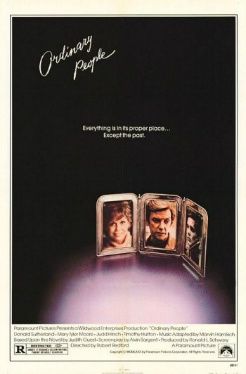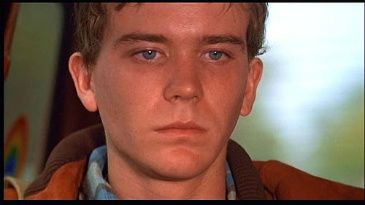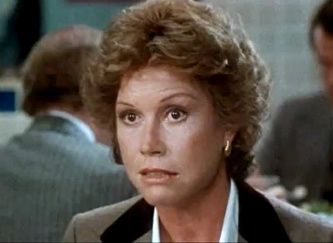
Ordinary People
1980
Director: Robert Redford
Starring: Timothy Hutton, Mary Tyler Moore, Donald Sutherland, Judd Hirsch
Before I dive right in with my thoughts on Ordinary People, I have to say something about myself and my film tastes. I hate melodramas. There is nothing worse for me than overly emotional film. They make me want to use my fingernails to peel back the skin on my arms. I think they are maudlin and manipulative, and I absolutely detest feeling as though a movie is overtly emotionally manipulating me. I’m thinking of movies like Stepmom, Swing Kids, and pretty much any Robin Williams drama. My most detested movie of all time – OF ALL TIME – is Dead Poets Society. There isn’t enough money in the world to make me watch that piece of tripe again, unless I play the drinking game where I have to drink every time the movie makes me roll my eyes. At that rate, I’d be drunk about twenty minutes in. I hate hate HATE overly emotional sappy sentimentalism. I have little to no patience for it in movies I choose to watch. It’s my least favorite type of movie ever.
All of which made me very nervous to watch Ordinary People, because that’s what I thought it was.
Holy f**k was I wrong.
Listening to the plot description, I think you can see why I was a little bit nervous to watch it. Conrad, a teenager (Hutton, in a role that made him the youngest male actor to ever win a competitive Oscar), is struggling through a dark time with his family. His revered older brother has died in a boating accident, and Conrad is recovering from his own suicide attempt. His mother (Moore) is emotionally distant and his father (Sutherland) is trying too hard to make Conrad feel loved. It’s only when Conrad starts seeing a psychiatrist (Hirsch) that he can really start to face his demons and heal.
I mean, I’m sorry, but that sounds like a Lifetime Movie of the Week.
It’s so not.
What I absolutely adore about Ordinary People is that it’s practically a master class in how to do an emotional film WELL, and a lot of that comes down to the performances. They are stellar across the board. Hutton is a revelation in this role, easily the finest I’ve seen him in. It shows that he is capable of greatness. The way he delivers his answer to the repeated question of “Conrad, are you OK?” is brilliant. His quick, dismissive, nodding reply of “I’m good, I’m fine, I’m good,” comes out of his mouth several times throughout the film, and it is clear that this is a learned behavior. It’s his defense against prying eyes, trying to keep people from worrying about him. The physicality he imbues in the role is fantastic. Conrad is tetchy and hunched over, constantly bouncing a knee up and down, rarely making eye contact, speaking in a low voice – all the classic signs of someone who has shut down. When Conrad works through the crippling emotions of guilt, sadness, and anger that he still has regarding his brother’s death, his suicide, and his strained relationship with his family, Hutton does it in an incredibly genuine and honest way. Conrad’s therapy never seems forced or disingenuous. In a climactic scene, I actually found myself moved to tears by Hutton’s performance. Hutton more than deserved his Oscar for this film (although I don’t understand why it was for Best Supporting Actor – he’s clearly the lead).

Well, Hutton won the Oscar, but Mary Tyler Moore and Judd Hirsch were also nominated for their roles, although they didn’t win. Moore is unbelievable and unrecognizable as the implacably cold mother, Beth. She is the closest thing the film has to a villain, but the genius of her portrayal is that, despite the incredible coldness of the character, ultimately, we understand Beth’s humanity. She is a woman who is grieving for her lost son and who doesn’t understand what her younger son is going through; at the same time, she is desperate for a sense of normalcy in her life. At one point she says, “My god, haven’t we had enough change?!?” That is Beth. She likes her upper middle class life, she likes her friends, she likes going out to the theater, she likes her parties, and she just wants to escape into that world in order to get away from the despair that eats at her heart. When her son enters into therapy, she is beyond mortified, because she would much rather cover up emotional distress than deal with it head on. Moore is phenomenal.

Ordinary People is a tremendously quiet film. There is not a lot of background music. Redford does use Pachelbel’s Canon in D a few times, but he doesn’t overuse it, and that’s just about the only piece of soundtrack music used. Instead, Redford wisely opts for silence. The silence in this film speaks volumes, and it contributes to the palpable sense of emotional repression and stifling, easily the theme of the film. A generic sweeping score has no place in a film like this, about people like this who just don’t know how to deal with their very scary emotions. Silence is such a better choice. This coming from someone who loves music in film!
Redford, who won an Oscar for Best Director, uses mostly static camera shots. He doesn’t try to get fancy or too technical in terms of camera angles. It reinforces the emotionally stagnant family relationship in the film incredibly well. What it manages to do is build emotional tension to the point where every small slight is felt acutely in the audience. And hey, static cameras aren’t necessarily a bad thing – Yasujiro Ozu built an entire storied career on a stationary camera!
Ordinary People is perhaps unfairly remembered as “The film that beat Raging Bull in the Oscars.” Personally, I’m not really a Scorsese fan. I have seen both of these films, and I would pick Ordinary People over Raging Bull in a heartbeat. It’s not a close contest for me. Ordinary People is an extraordinary film.
Arbitrary Rating: 10/10. It’s just that good.
It's sort of like coming out of the closet to say that you think Ordinary People was the right Oscar choice. I'm with you, though. I think I'd have been happy with either selection, but Ordinary People isn't a bad choice or the wrong choice.
ReplyDeleteI have a tendency to ask people when they've seen this last when they complain about it winning. It still holds up--it's still as powerful now as it was then.
There is DEFINITELY a feeling in film communities of "I *shouldn't* like Ordinary People as much as I do because of its history at the Oscars."
DeleteWhatever. It's awesome. I'm glad to find other people who like it too.
wwhc993knx
ReplyDeletegolden goose outlet
golden goose outlet
golden goose outlet
golden goose outlet
golden goose outlet
golden goose outlet
golden goose outlet
golden goose outlet
supreme outlet
golden goose outlet